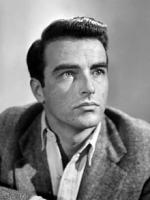Disable ads!
Montgomery Clift
Montgomery Clift Publicity still of Clift, c. 1948. Born Edward Montgomery Clift (1920-10-17)October 17, 1920 Omaha, Nebraska, U.S. Died July 23, 1966(1966-07-23) (aged 45) New York City, New York, U.S. Cause of death Heart attack brought on by occlusive coronary artery disease Occupation Actor Years active 1933–66 Edward Montgomery "Monty" Clift (October 17, 1920 – July 23, 1966) was an American film and stage actor. The New York Times’ obituary of Clift noted his portrayal of "moody, sensitive young men". He often played outsiders and "victim-heroes"; examples include the social climber in George Stevens's A Place in the Sun, the anguished Catholic priest in Alfred Hitchcock's I Confess, the doomed regular soldier Robert E. Lee Prewitt in Fred Zinnemann's From Here to Eternity, and the Jewish GI bullied by antisemites in Edward Dmytryk's The Young Lions. Along with Marlon Brando and James Dean, Clift was one of the original method actors in Hollywood; he was one of the first actors to be invited to study in the Actors Studio with Lee Strasberg, Michael Chekhov and Stella Adler. He also executed a rare move by not signing a contract after arriving in Hollywood, only doing so after his first couple films were a success—"a power differential that would go on to structure the star-studio relationship for the next 40 years." After surviving a car crash in 1956, which left his face partially paralyzed and his profile altered, Clift became addicted to alcohol and prescription drugs, leading to his erratic behavior off screen. Nevertheless, he continued his acting career, playing such parts as "the reckless, alcoholic, mother-fixated rodeo performer" in John Huston's The Misfits and the title role in Huston's Freud: The Secret Passion. In 1961, Clift portrayed Rudolph Peterson, a victim of forced sterilization at the hands of Nazi authorities in the Stanley Kramer film Judgment at Nuremberg, earning a nomination for an Academy Award for Best Supporting Actor. Clift received four Academy Award nominations during his career, three for Best Actor and one for Best Supporting Actor. He would be considered by the end of his short life, "One of the most tragic, beautiful and gifted figures to touch Hollywood (along with Brando and others) with their unique and rebellious presence and changing the masculine role portrayed by Hollywood after World War II."He was also the first American actor after 1945 to change how audiences saw film, from cliché masculine heroes like John Wayne to characters so realistic and relatable, people would report crying and gasping from his "most natural presence and beautiful looks".
 Read more on wikipedia.org Read more on wikipedia.org
 All quotes by Montgomery Clift All quotes by Montgomery Clift
 Edit Edit
|

|
|
|
|
|
Background photo by Giuliana
|